Gomez : Interview du 01/03/2002
Présents: Tom Gray et Ben Ottewell
Par Patrick Wack & Julien Tartaglia.

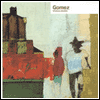
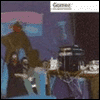
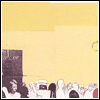

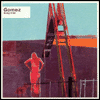
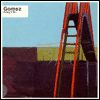
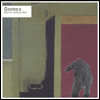
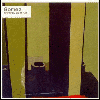
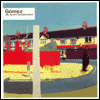
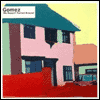
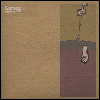
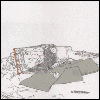
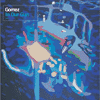
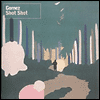
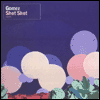
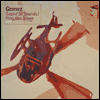
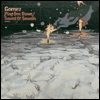
|
|
Happy Few : You guys are both lead singers, right?
Tom Gray (guitares, chant et clavier): Yeah, one singer missing.
HF: Ian.
TG: Yeah.
HF: After “Bring It On” (leur premier album sorti en 1998), you guys said you had no idea what Gomez was going to evolve into. Do you feel like the band and its music have changed a lot over the past four years?
TG: I wouldn't say that the music has changed an awful lot, philosophically speaking. We still make the same kind of music but it doesn't sound the same.
Ben Ottewell (guitares et chant): The approach is still the same.
TG: We still are coming from the same place. We're still interested in making music sound different.
HF: You used a lot of brass and electronic tools on the new record. Some songs are still slow and quiet but some have become even more captivating.
BO: Yeah, the BPM counter has gone up (souriant).
TG: The songs have gotten faster since the electronics have appeared (rires).
BO: Electronics have always been there in our records. We just had more time to get acquainted with synthesisers and machines this time.
TG: The new album has got a lot more energy in it. It isn't so stoned. It's a bit drunk and a little less stoned. (rires)
BO: And caffeine fever's in it also.
HF: I believe the songs on the first two albums were actually written at the same time, even before you started recording “Bring It On”.
BO: Yeah, we actually had one long recording session.
TG: We kept recording all the way through.
HF: So you released the first half of the songs for “Bring It On” and…
TG: well, they were recorded first. We recorded them, then released them and went touring but carried on recording as we were touring. Then released those as our second album.
BO: A lot of the songs on “Liquid Skin” (leur deuxième album, 1999) were in kind of an embryonic form around the time of “Bring It On”.
HF: Can you tell us about the recording of the new album?
TG: It's recorded very much like “Bring It On” was recorded. We went away to a house on the countryside in… (cherchant)
HF: Gloucester?
TG: Yes, in Gloucester (en me reprenant bien sur l'accent). We went to this neo-gothic mansion, took our recording machines with us and just made it up as we went along. We produced it ourselves again and recorded it ourselves.
HF: Is it like a Radiohead trend? (“Kid A” et “Amnesiac” ont été enregistrées dans de grands manoirs anglais)
TG: Well, “Bring It On” was already recorded in much the same way. Actually I think we started the trend. (rires)
HF: Oh, you started the trend?
BO: Not for the mansion thing though…
TG: Oh yeah, Radiohead did the mansion thing before but I think Led Zeppelin probably started the mansion thing a long time ago.
HF: and the Stones also did when they came to southern France
BO: Oh Yeah, for “Exile” (“Exile on Main Street”)
TG: It's unbelievable but mansions are cheaper than studios
HF: And the atmosphere…
TG: is much better, yeah…
BO: More ghosts around!
TG: We don't really like studios.
HF: Do you have a particular writing process?
TG: No, we're kinda ridiculous. We don't have a system or an idea. We're…
HF: democratic?
TG: No, no, not even democratic. We're not anything, we just do it.
BO: We have an understanding.
TG: An understanding? You might have an understanding. I don't have one!
BO: Yeah! We have an understanding between ourselves. We have similar tastes, I guess…
TG: Usually, one person will write a melody.
HF: so you start with the music?
TG: music usually, sometimes lyrics. That's the problem with us, whatever I say there's always gonna be an exception.
BO: there's always a black swan… (rires)
TG: Yep, a black swan swimming through it all…
HF: So the recording hasn't changed that much because the recording of “Bring It On” was also very low-fi.
TG: Well, yeah. Actually this last recording was very low-fi (me reprenant lourdement sur la prononciation).
HF: Do you record live?
TG: Sometimes (rires). The only major difference with this album is that it is recorded digitally. It's a digital album. I wouldn't say it's an electronic album, but a digital album. The acoustics are recorded very cleanly and stuff like that.
BO: Low-fi digital, I guess.
TG: Low-tech rather than low-fi.
HF: You lost me there…
TG: Let's just say low-budget (rires).
HF: But that's your choice, right? You guys have plenty of means now.
BO: We do but the most expensive way of doing things isn't always the best.
HF: You guys usually say that you have no direct influences but the way you use natural instruments, brass, keyboards and sound effects reminds me a lot of Beck.
TG: It's not that we are influenced by Beck. It's that Beck works in a similar field, in the same sort of place.
HF: He kind of opened the way…
TG: Well, to an extent, yes. “Mellow Gold” was a very important record for me and the rest of the guys when we were young. He showed that you can do something crazy with music and get away with it. You know, just that idea…
HF: “Whippin' Piccadilly” ( sur “Bring It On”) is about going to a Beck gig, by the way?
TG: Yeah, it is. It's not that we make music that sounds like Beck. If you play a Gomez album and a Beck album, it doesn't sound the same. I Understand where you're coming from though. He reminds me of us a little, maybe. We're philosophically similar.
BO: Similar static. The thing is with Beck, especially now, is that what he seems to do, which is something we don't do, is pick a niche for himself. His last two records were like: “I'm gonna do this kind of record, then I'm gonna do this kind of record…”
HF: You mean like his funk record? ("Midnite Vultures")
BO: Yeah, “I'm gonna make a Princy funk record, I'm gonna make an acoustic song record”
TG: Yeah, he lost me with that…
BO: We don't really set out to make one kind of record or one kind of song in particular.
TG: I love albums that vary throughout. I don't like records that have one idea, one paradigm. I get bored easily. Our music is done because we get bored easily. If you're bored, you find something else to do. So that's all we do, really.
HF: You started music in Southport. Was it like your only way to escape? What kind of a town is Southport?
TG: It wasn't like it was the only way to escape. It was kind of a sub-culture . We were young and all taking drugs together, making stupid music. Just enjoying ourselves.
HF: Many English bands say they started playing music because they were bored. How do you explain the fact that your music is so different from anything done in the UK?
BO: because we're different, I guess.
HF: The whole British pop scene is very similar these days…
TG: We make music because we don't want it to all sound the same. That's why we started music. We were bored with music. We own all these great albums, and there's all these records being made that are just boring, you know… Shit! What is this rubbish! That's why we actually started making music, to satisfy our own tastes.
HF: So you actually listen to your records?
TG: Yeah, yeah, that's why we did that, the first thing we did. We actually made music so that we could listen to it. Not for anybody else. We never went on tour or even tried to find an audience.
BO: We weren't really a band.
TG: We just did it for our own amusement. It was like: “let's try to make something that sounds good”. And then we thought it sounded good, it was like a surprise.
HF: That's a good motivation…
TG: Well… What else could it be?
HF: Well, some bands admit they just want to be famous…
BO: Or get chicks…
TG: That's just fucked up. You're starting from a fucked up position there…
HF: You guys have three lead singers on the band which is pretty rare for a rock band. Voices and vocal harmonies are a big part of your music. Was it a conscious choice or just luck to have three guys that can sing this well and be so complementary?
TG: Yeah, it's just that they were there.
BO: I was drafted in for my voice. Like a striker in football, you know, I was signed. (rires)
TG: We were existing for a very short period with two singers and then we brought Ben in as well.
HF: For the blues aspect?
TG: Just because he's got a great voice.
BO: And we got along reasonably well.
TG: But yeah, the blues thing is his fault…
HF: When people listen to your music for the first time, the first thing that comes up is Ben's voice because it's so different, then they listen more and the other voices catch their ear, then come the music and the lyrics. Every element of your music sounds original.
BO: That's why we started, to retain some interest.
TG: We try very hard to make records that get better the more you listen to them. Even if you've had the record for awhile, you can't have heard everything because there's just too many silly details being thrown in there. It's like in the Simpsons when things happen in the background.
HF: Another important aspect of your music is that it creates some kind of a coherent universe. You can just sit back, light up a joint and enjoy the ride. Is it one of your goals to take people to another place?
TG: We like records that make you forget where you started _ of the way through. You listen to it and after seven tunes, you're like “when did I come into this?”. There's very few records that do that well. I don't know if we do it well but we try. You want to look at people lost in the music. What we do is not about what's cool or what's fashionable, we're not about anything else than music. The most important thing to us is … not educate people because that would sound patronising and stupid but open people's ears a little bit. Because I think people's ears have become very conservative in a very strange sort of way.
HF: Mainstream is everywhere…
BO: Even what is considered alternative seems now conservative.
TG: It's not that our music is not mainstream because it is mainstream in a strange way. They are just songs.
BO: Our melodies aren't complicated.
TG: It's not like we're playing improvisational jazz or crazy avant-garde… We're not pretentious in that sort of sense. It's rock music in one form or another, which is to some extent mainstream. It's just that because people's tastes have become conservative, we seem quite strange but really we're not that strange. You think of what people listened to in 1966. A very simple example is “Revolver” by the Beatles. Classic album. It starts with “Taxman”, then it has “Eleanor Rigby”. It ends with “Tomorrow never knows”. It has “Yellow Submarine” on it. How is it that in 36 years, we could have gone from a position where people were willing to listen to anything and everything on one record to a position where we've become so conservative that we seem to be out of the mainstream or a peripheral band? It's not that we're as good as the Beatles, it's that we're not doing anything stranger than what the Beatles were doing in 1966.
BO: It was received as a pop record.
TG: Or a step forward, a progression. It's strange to me that we as music listeners now accept that our records have to be formatted, have to be genres, “I have my funk album, I have my hip-hop album…” Radios play certain types of music…
BO: Producers are drafted in so that they can make albums sound the same all the way through. Coherent Units… (l'air dépité)
TG: Music's not coherent. Music's a crazy mess you can do the hell you like with. People tend to devote their ambition to their careers rather than to their music. We don't stand for anything else than tunes.
HF: On stage you definitely sound different. From your last tour I could tell you like to jam a lot, people can feel you're on stage to enjoy yourselves in the first place and that's why none of your gigs is similar to another.
TG: We love making music, that's the thing.
BO: I'm playing music, man. It's great.
HF: Do you consider yourselves a psychedelic band?
TG: A little bit. A little bit of us is psychedelic.
BO: We did psychedelic drugs you know, so…
TG: We don't anymore. (dit-il, le visage tranché d'un grand sourire) But in our teens we did a lot of psychedelics. I still listen to music like I was on drugs. I remember the feeling of being out of my mind and hallucinating and the way music sounds when you're on drugs… I'm sure our records must sound really good when you're on drugs.
HF: Oh yeah… (rires)
TG: I think the thing is that we're not a psychedelic band, it's just that our music…
HF: Is for psychedelic people?
TG: Yeah! (rires)
BO: Our understanding of music was kinda shaped by drug use.
TG: We did an awful lot of drugs but you kinda come down. You need to be able to concentrate.
HF: Your albums are really balanced between slow, quiet songs and captivating ones. Is that a choice?
TG: It's not that we want to do anything. It's just the way it is. Some songs have to be quiet and others have to be loud and in your face. We're exploring music.
BO: We try to make varied records, not to stay in one place so when it comes to choosing the track listing, we try to make it like that.
TG: Your average Gomez fan is gonna have quite a broad taste.
HF: Your music can be considered as a way towards other genres.
TG: That's what we were saying about opening people's minds. That's something we do think about. It's not like we're on a mission or a crusade. But it is something that occurs to us occasionally. It's particularly strange to me people are so conservative with their music tastes. It's bizarre to me.
HF: Well, not everybody's that interested in music. They'll just listen to the radio and take what they're being fed with.
TG: That's a sad thing…
HF: Well, for some people music in not the only interest in life… (je le provoque un peu et ça marche)
TG: Of course, but that's a shame to deny the importance of music that can give them a fulfilling experience as opposed to the music they hear on the radio which is more or less likely to shrink their brains… We're genuinely going against the grade, fighting against the tide of shit. I'm trying to say music is important. I think a lot of the reasons why it's OK to make boring albums is because people are accepting the music is just a thing. Which is fair enough but when I say I love music, I attach a value to it, you know. I know as well as you do that music isn't actually important but because I love it, it is important. It may not be in reality, in consensus but it is fucking important! We're doing this because music is important and not just another fucking thing to do. We're not people who just happen to be making music, we do it because music is… it!
HF: What have you been listening to these days besides your own albums? (rires) Does anybody impress you right now in the UK?
TG: Super Fury Animals, they're a good band.
BO: Roots Manuva.
HF: What about The Music?
TG: I've only heard one or two tracks.
BO: They remind me of Jane's Addiction, strangely…
HF: At the same period, you played at the Café de la Danse (11e) and then you opened for Ben Harper in Bercy. That's really not the same kind of venue. Which one do you think fits your music the best?
TG: Bercy.
HF: Bercy?!! So you prefer playing for 12.000 people?
TG: The problem with the Café de la Danse is that you can't turn up the volume. In Paris, there is a decibel meter and that kinda fucks us because we don't do quiet gigs, we do loud gigs… You need to see us in a real venue.
Propos recueillis par Patrick et Tarta
|
La discographie Gomez :
• "78 stone wobble" (single, 98)
• "Bring it on" (album, 98)
• "Get myself arrested" (single, 98)
• "Whippin Piccadilly" (single, 98)
• "Bring it on" (single, 99)
• "Rhythm & blues alibi" (single, 99)
• "Liquid skin" (album, 99)
• "We haven't turned around" (single, 99)
• "Machismo EP" (EP, 00)
• "Abandonned shopping trolley hotline" (album, 00)
• "Interview" (01.03.02) 
• "Shot shot" (single, 02)
• "In our gun" (album, 02) 
• "Sound of sounds/Ping one down" (single, 02)



